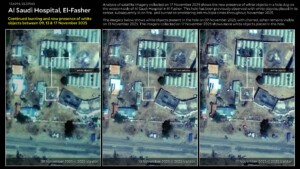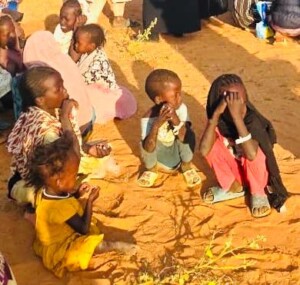Sudanese economists: ‘Khartoum must stop the wars first’
In order to tackle the country’s economic crisis, the Sudanese government should stop the wars in the country. Khartoum should create an appropriate climate for investment and industries and combat corruption, economic experts say.
In his speech to the nation on Monday, President Omar Al Bashir introduced a “comprehensive political and economic reforms” programme to solve the current crisis in the country.
The new emergency measures aim to stimulate production, increase exports, and control imports. They will include “specific projects with direct returns, in order to boost performance and achievements in the macro-economic sectors,” he said.
 Dr Hasan Bashir, Professor of Economics at El Nilein University in Khartoum (file photo)
Dr Hasan Bashir, Professor of Economics at El Nilein University in Khartoum (file photo)
In order to tackle the country's economic crisis, the Sudanese government should stop the wars in the country. Khartoum should create an appropriate climate for investment and industries and combat corruption, economic experts say.
In his speech to the nation on Monday, President Omar Al Bashir introduced a “comprehensive political and economic reforms” programme to solve the current crisis in the country.
The new emergency measures aim to stimulate production, increase exports, and control imports. They will include “specific projects with direct returns, in order to boost performance and achievements in the macro-economic sectors,” he said.
The number of ministries will be reduced from 31 to 21. The number of ministries in the states will be downsized as well.
According to Professor Hamid Eltigani, Head of Public Policy and Administration at the American University in Cairo, the government should be more realistic.
“The government can significantly reduce its expenditure by stopping the wars in Darfur, Blue Nile and the Nuba Mountains [in South Kordofan],” he said. “Moreover, new production projects need years of planning and implementation.”
As for the chronic shortage of hard currency and cash money in the country, Eltigani said that Al Bashir is counting on rapidly-earned revenues. “From the gold industry, South Sudan payments of its outstanding oil debts and compensation for the destruction of the oil-rich Heglig area, in addition to foreign grants and loans.”
Infrastructure
Dr Hasan Bashir, Professor of Economics at El Nilein University in Khartoum, doubts the impact of the new measures as well.
“Reducing the number of ministeries is a good step. The percentage of government spending in Sudan is the largest in the world, compared to the Gross Domestic Product,” he told Radio Dabanga on Tuesday.
“Yet, the main problems of the Sudanese economy, the collapse of infrastructure, extremely poor services, and a monopolised private sector, need much more interventions,” he added.
“All indicators for a successful implementation of the five-year programme that ends next year are low,” he stated. “There are no positive signs, except for the gold mining industry, which depends on traditional prospecting.”
The economist conditioned a successful implementation of any economic reform programme with an appropriate investment and industry climate, enhancement of the efficiency of the executive bodies, and clear transparency and accountability procedures.
Expenditure
Former Finance Minister Ezeldin Ibrahim, as well pointed to the high the government do more to bring down its expenses. He estimates the total expenditure of the now dissolved 31 ministries to be about SDG 127 trillion. “After the reduction of ten ministries, only SDG 43 trillion will be saved,” he told El Sudan El Yoam on Wednesday.
The costs for Sudan’s 16,000-vehicle fleet total about SDG 96 trillion. The monthly expenditure for the state parliaments amounts to nearly SDG 3 billion a month.
Former Investment Minister Mubarak El Fadil responded on Al Bashir’s new plans by saying that the economic crisis in the country “cannot be tackled except by the completion of normalisation of the relations with the USA”.
At a news conference in Khartoum on Wednesday, he proposed that the government should first seek to fulfil the conditions for this normalisation and stop the war in Darfur and the Two Areas, and the gagging of the opposition.
The lifting of the last sanctions and debt forgiveness will allow the government and the private sector to obtain loans needed for development, he said.
Crisis
The former Investment Minister accused companies owned by government officials and by affiliates of the ruling National Congress Party of being behind the current financial crisis. “They are pushing the currency rates on the parallel market upwards by buying large quantities of US Dollars, and putting the money on foreign accounts.”
El Fadil further claimed that the independence of the Central Bank of Sudan has contributed to the financial crisis. Former director of the Central Bank of Sudan Hazim Abdelgadir “was unique in monetary policy,” he said. “He issued 21 publications without prior consultation with the government.”
Sudan is suffering from a chronic lack of hard currency and cash, while the exports are dwindling. High inflation figures caused a severe drop in purchasing power among the Sudanese since early January, after the government implemented major austerity measures. The country is also witnessing recurrent fuel and wheat shortages. Several economists have warned for an economic collapse.











 and then
and then